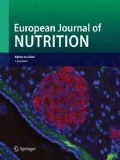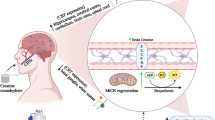Abstract
Purpose
People may be unable to obtain anything edible for days under some circumstances, but they must maintain their calmness and cognition to navigate solutions. Our aim was to study changes in subjective sensations and cognition in healthy adults during a 10-day complete fasting experiment.
Methods
Thirteen healthy male volunteers voluntarily participated in the 22-day experiment comprising 4 phases: 3 days of baseline consumption, 10 days of complete fasting (only water ad libitum), 4 days of calorie restriction, and a 5-day recovery period. The volunteers’ subjective sensations, cognitive performance, and serum energy substances were measured at 6 time points.
Results
Across the 6 time points, the trajectories of subjective sensations in response to fasting were “U”- or “ ∩ ”-shaped curves instead of progressive discomfort or mood enhancement. A significant fasting time effect was found on depression-dejection (baseline: 16.85 ± 2.88; highest score on the third day of completing fasting: 17.69 ± 3.97, P = 0.04) and self-rated anxiety (baseline: 26.23 ± 4.75; highest score on the sixth day of completing fasting: 30.85 ± 5.58, P = 0.01), and the change curves were consistent with the inflection point of the energy substrates shifting from serum glucose to ketone. In addition, basic cognitive functions appeared to be unaffected during the 10-day fast.
Conclusions
Our study showed strong influences on the sensations from the third to sixth days of the prolonged fasting period but no significant effects on basic cognitive abilities associated with the energy substance switch. These findings could contribute to the development and understanding of survival strategies in food-shortage emergencies or of intermittent fasting programmes.






Similar content being viewed by others
Abbreviations
- TG:
-
Triglycerides
- CHOL:
-
Cholesterol
- LDL-C:
-
Low-density lipoprotein cholesterol
- HDL-C:
-
High-density lipoprotein cholesterol
- BL:
-
Baseline period
- FT:
-
Fasting period
- CR:
-
Calorie restriction period
- RE:
-
Recovery period
- PVT:
-
Psychomotor vigilance test
References
Cahill GF Jr (2006) Fuel metabolism in starvation. Annu Rev Nutr 26:1–22. https://doi.org/10.1146/annurev.nutr.26.061505.111258
Kohn N, Toygar T, Weidenfeld C, Berthold-Losleben M, Chechko N, Orfanos S, Vocke S, Durst A, Laoutidis ZG, Karges W, Schneider F, Habel U (2015) In a sweet mood? Effects of experimental modulation of blood glucose levels on mood-induction during fMRI. Neuroimage 113:246–256. https://doi.org/10.1016/j.neuroimage.2015.03.024
Peters A (2011) The selfish brain: competition for energy resources. Am J Hum Biol 23(1):29–34
Hitze B, Hubold C, Van Dyken R, Schlichting K, Lehnert H, Entringer S, Peters A (2010) How the selfish brain organizes its supply and demand. Front Neuroenerget 2:7
Solianik R, Sujeta A, Terentjevienė A, Skurvydas A (2016) Effect of 48 h fasting on autonomic function, brain activity, cognition, and mood in amateur weight lifters. BioMed Res internat 2:16
Lieberman HR, Caruso CM, Niro PJ, Adam GE, Kellogg MD, Nindl BC, Kramer FM (2008) A double-blind, placebo-controlled test of 2 d of calorie deprivation: effects on cognition, activity, sleep, and interstitial glucose concentrations. Am J Clin Nutr 88(3):667–676. https://doi.org/10.1093/ajcn/88.3.667
Cheatham RA, Roberts SB, Das SK, Gilhooly CH, Golden JK, Hyatt R, Lerner D, Saltzman E, Lieberman HR (2009) Long-term effects of provided low and high glycemic load low energy diets on mood and cognition. Physiol Behav 98(3):374–379. https://doi.org/10.1016/j.physbeh.2009.06.015
Tian HH, Aziz AR, Png W, Wahid MF, Yeo D, Constance Png AL (2011) Effects of fasting during ramadan month on cognitive function in Muslim athletes. Asian J Sports Med 2(3):145–153. https://doi.org/10.5812/asjsm.34753
Pender S, Gilbert SJ, Serpell L (2014) The neuropsychology of starvation: set-shifting and central coherence in a fasted nonclinical sample. PLoS ONE 9(10):e110743. https://doi.org/10.1371/journal.pone.0110743
Bolton HM, Burgess PW, Gilbert SJ, Serpell L (2014) Increased set shifting costs in fasted healthy volunteers. PLoS ONE 9(7):e101946. https://doi.org/10.1371/journal.pone.0101946
Doniger GM, Simon ES, Zivotofsky AZ (2006) Comprehensive computerized assessment of cognitive sequelae of a complete 12–16 hour fast. Behav Neurosci 120(4):804–816. https://doi.org/10.1037/0735-7044.120.4.804
Bouwman V, Adriaanse MC, van Riet E, Snoek FJ, Dekker JM, Nijpels G (2010) Depression, anxiety and glucose metabolism in the general dutch population: the new Hoorn study. PLoS ONE 5(4):e9971. https://doi.org/10.1371/journal.pone.0009971
Benton D (2002) Carbohydrate ingestion, blood glucose and mood. Neurosci Biobehav Rev 26(3):293–308
Li C, Ostermann T, Hardt M, Lüdtke R, Broecker-Preuss M, Dobos G, Michalsen A (2013) Metabolic and psychological response to 7-day fasting in obese patients with and without metabolic syndrome. Complement Med Res 20(6):413–420
Watkins E, Serpell L (2016) The psychological effects of short-term fasting in healthy women. Front Nutrit 3:27
Michalsen A (2010) Prolonged fasting as a method of mood enhancement in chronic pain syndromes: a review of clinical evidence and mechanisms. Curr Pain Headache Rep 14(2):80–87
Fond G, Macgregor A, Leboyer M, Michalsen A (2013) Fasting in mood disorders: neurobiology and effectiveness. A review of the literature. Psychiatry Res 209(3):253–258. https://doi.org/10.1016/j.psychres.2012.12.018
Zhang Y, Liu C, Zhao Y, Zhang X, Li B, Cui R (2015) The effects of calorie restriction in depression and potential mechanisms. Curr Neuropharmacol 13(4):536–542. https://doi.org/10.2174/1570159x13666150326003852
Keys A, Taylor HL, Grande F (1973) Basal metabolism and age of adult man. Metabolism 22(4):579–587. https://doi.org/10.1016/0026-0495(73)90071-1
Hockey GR (1997) Compensatory control in the regulation of human performance under stress and high workload; a cognitive-energetical framework. Biol Psychol 45(1–3):73–93. https://doi.org/10.1016/s0301-0511(96)05223-4
Longo VD, Mattson MP (2014) Fasting: molecular mechanisms and clinical applications. Cell Metab 19(2):181–192
Appleton KM, Baker S (2015) Distraction, not hunger, is associated with lower mood and lower perceived work performance on fast compared to non-fast days during intermittent fasting. J Health Psychol 20(6):702–711
Michalsen A, Schneider S, Rodenbeck A, Lüdtke R, Huether G, Dobos G (2003) The short-term effects of fasting on the neuroendocrine system in patients with chronic pain syndromes. Nutrit Neurosci 6(1):11–18
Zhang M, Tanenbaum HC, Felicitas-Perkins JQ, Pang Z, Palmer PH, Duan H, Johnson CA, Xie B (2017) Associations between psychological characteristics and indicators of metabolic syndrome among Chinese adults. Psychol Health Med 22(3):359–369
van de Rest O, van der Zwaluw NL, de Groot LC (2018) Effects of glucose and sucrose on mood: a systematic review of interventional studies. Nutr Rev 76(2):108–116
Cox PJ, Clarke K (2014) Acute nutritional ketosis: implications for exercise performance and metabolism. Extreme Physiol Med 3(1):17
Owen OE (2005) Ketone bodies as a fuel for the brain during starvation. Biochem Mol Biol Educ 33(4):246–251
Masino S, Kawamura M Jr, Wasser C, Pomeroy L, Ruskin D (2009) Adenosine, ketogenic diet and epilepsy: the emerging therapeutic relationship between metabolism and brain activity. Curr Neuropharmacol 7(3):257–268
Maridakis V, O’Connor PJ, Tomporowski PD (2009) Sensitivity to change in cognitive performance and mood measures of energy and fatigue in response to morning caffeine alone or in combination with carbohydrate. Int J Neurosci 119(8):1239–1258
Jensen NJ, Nilsson M, Ingerslev JS, Olsen DA, Fenger M, Svart M, Moller N, Zander M, Miskowiak KW, Rungby J (2020) Effects of beta-hydroxybutyrate on cognition in patients with type 2 diabetes. Eur J Endocrinol 182(2):233–242. https://doi.org/10.1530/EJE-19-0710
Warren RE, Frier BM (2005) Hypoglycaemia and cognitive function. Diabetes Obes Metab 7(5):493–503
Schultes B, Peters A, Kern W, Gais S, Oltmanns KM, Fehm HL, Born J (2005) Processing of food stimuli is selectively enhanced during insulin-induced hypoglycemia in healthy men. Psychoneuroendocrinology 30(5):496–504
Acknowledgements
We thank all 13 volunteers for their contribution to this work.
Funding
These findings were supported by the Advanced Space Medico-Engineering Research Project of China (18035020103), the National Natural Science Foundation of China (Nos. 31470832 and 81801872), the State Key Laboratory of Space Medicine Fundamentals and Application, the China Astronaut Research and Training Center (SMFA17A02, SMFA17B04, SMFA17B06, SMFA18B02, and SMFA18B06), the Space Medical Experiment Project of China Manned Space Program (HYZHXM01002), and Shenzhen Science and Technology Program (CKFW2016082915204709).
Author information
Authors and Affiliations
Contributions
ZD, YL and RW designed the research; CY, QM, HZ, FW, MW, CjY, YC, JX, WL, and HW performed the research and collected the data; CY, QM, HZ, MW, and ZD analysed the data; and CY, QM, RW, HZ, and ZD wrote the manuscript. ZD, RW and YL had primary responsibility for the final content. All the authors conducted the research and read and approved the final manuscript.
Corresponding authors
Ethics declarations
Conflict of interest
On behalf of all the authors, the corresponding author states that there is no conflict of interest.
Supplementary Information
Below is the link to the electronic supplementary material.
Rights and permissions
About this article
Cite this article
Yang, C., Ma, Q., Zhang, H. et al. Ten days of complete fasting affected subjective sensations but not cognitive abilities in healthy adults. Eur J Nutr 60, 2747–2758 (2021). https://doi.org/10.1007/s00394-020-02450-7
Received:
Accepted:
Published:
Issue Date:
DOI: https://doi.org/10.1007/s00394-020-02450-7




